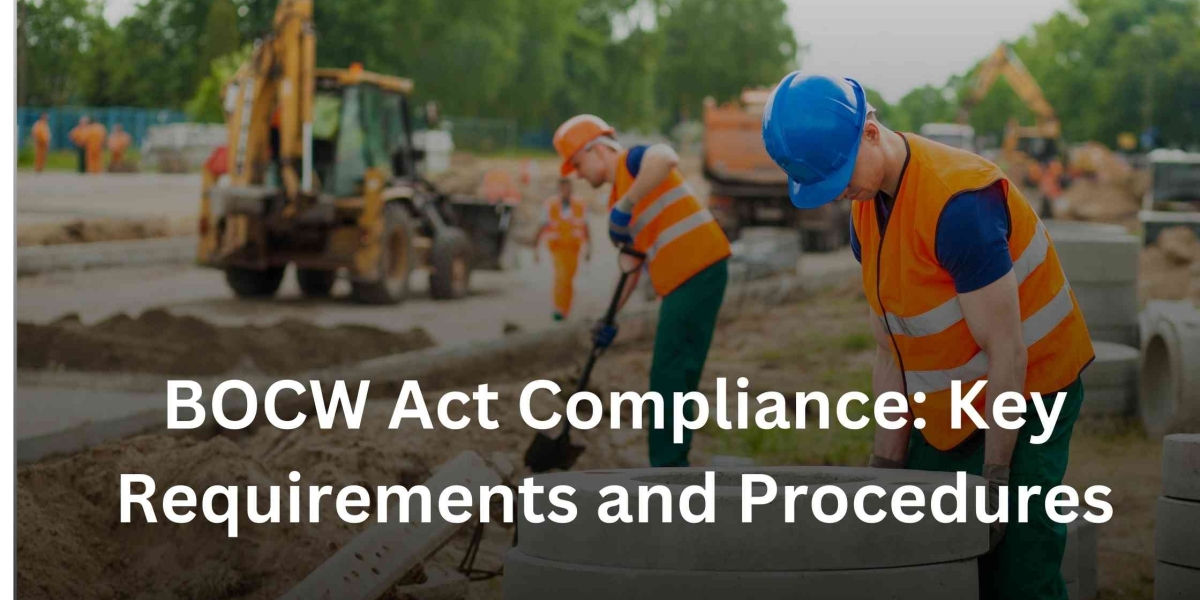The Building and Other Construction Workers (BOCW) Act, 1996, is a significant piece of legislation in India aimed at safeguarding the rights and welfare of construction workers. Compliance with the BOCW Act is crucial for employers in the construction industry, not only to ensure legal adherence but also to promote the well-being of their workforce. This blog will explore the key requirements and procedures for BOCW Act compliance, including BOCW Act registration and the process for bail applications.
Understanding the BOCW Act
The BOCW Act provides for the welfare of construction workers by mandating various safety and health measures, along with social security benefits. It covers workers involved in building or other construction activities, including those employed in the construction of roads, bridges, and buildings.
Key Requirements for BOCW Act Compliance
BOCW Act Registration
- Employer's Responsibility: Employers must register with the appropriate State Government authority. This involves submitting an application along with relevant documents, including details of the construction work, number of workers, and the nature of work.
- Registration Certificate: Upon successful registration, employers receive a certificate that must be renewed periodically. This registration is crucial for the legal operation of construction activities and ensures that the employer is compliant with the BOCW Act’s provisions.
Welfare Measures
- Health and Safety: Employers are required to provide adequate health and safety measures on-site. This includes safety equipment, first-aid facilities, and regular health check-ups for workers.
- Housing and Sanitation: Construction sites should provide adequate housing, clean drinking water, and sanitation facilities for workers.
Financial Contributions
- Welfare Fund: Employers must contribute to the Welfare Fund set up under the BOCW Act. This fund is used for various welfare schemes and benefits for construction workers.
- Payment of Cess: A cess is levied on the cost of construction work. Employers must deposit this cess with the State Government, which is used for worker welfare programs.
Social Security Benefits
- Insurance and Compensation: The Act mandates employers to provide insurance coverage and compensation for workers in case of accidents or injuries. This includes medical expenses and compensation for loss of income.
- Retirement Benefits: Employers are required to contribute towards the Workers’ Welfare Fund, which provides retirement benefits to construction workers.
Compliance with Labor Laws
- Employment Conditions: Employers must adhere to the provisions related to working hours, wages, and employment conditions as stipulated by the Act.
- Child Labor: The BOCW Act prohibits the employment of children in construction activities, ensuring that workers are of legal working age.
Procedures for BOCW Act Compliance
Application and Registration
- Submit Application: Employers should apply for registration with the State Government by submitting the necessary forms and documents.
- Verify Details: Ensure all information provided is accurate and complete to avoid delays in registration.
Maintain Records
- Worker Records: Maintain detailed records of all construction workers, including their personal details, wages, and working conditions.
- Site Records: Keep records of health and safety measures, welfare facilities, and financial contributions.
Regular Audits and Inspections
- Internal Audits: Conduct regular internal audits to ensure compliance with the BOCW Act’s provisions.
- Government Inspections: Be prepared for inspections by government authorities to verify compliance. Address any issues or violations promptly.
Training and Awareness
- Employee Training: Provide training to workers on health and safety measures, their rights under the BOCW Act, and proper use of safety equipment.
- Management Awareness: Ensure that management and supervisory staff are aware of their responsibilities under the Act.
Update and Renew
- Renew Registration: Keep track of registration renewal dates and ensure timely renewal of the registration certificate.
- Update Records: Regularly update records and documentation to reflect any changes in the workforce or construction activities.
Bail Applications and Compliance
In cases of non-compliance with the BOCW Act or other legal issues, employers or their representatives may face legal proceedings. If charged with violations related to the BOCW Act, the process of applying for bail may become relevant.
- Filing a Bail Application: In the event of arrest or legal action, filing a bail application is a critical step. This involves submitting an application to the relevant court, detailing the grounds for bail, and addressing any concerns related to the alleged violation.
- Legal Assistance: Engaging a legal expert can significantly aid in navigating the bail application process, ensuring that all legal requirements are met and that the application is properly presented.
Conclusion
Compliance with the BOCW Act is not just a legal obligation but a commitment to the welfare and safety of construction workers. By adhering to the key requirements and following the proper procedures, including BOCW Act registration in India and understanding the bail application process, employers can ensure they meet legal standards and contribute positively to the well-being of their workforce. Investing in the health, safety, and security of workers not only enhances compliance but also fosters a productive and ethical work environment.
For more detailed information or assistance with BOCW Act compliance and legal issues, consider consulting a legal expert or a compliance specialist.









